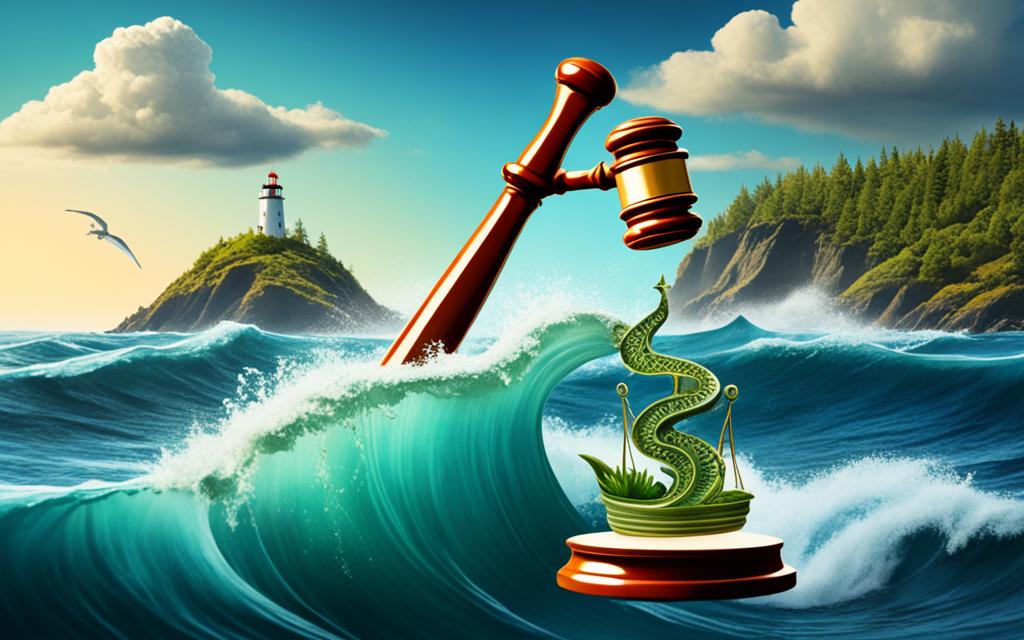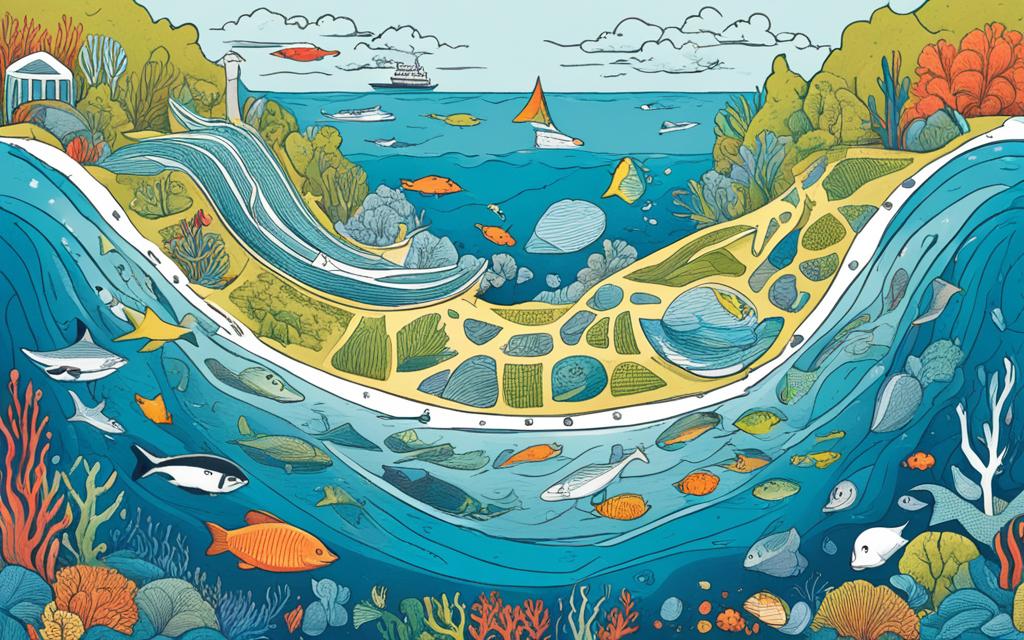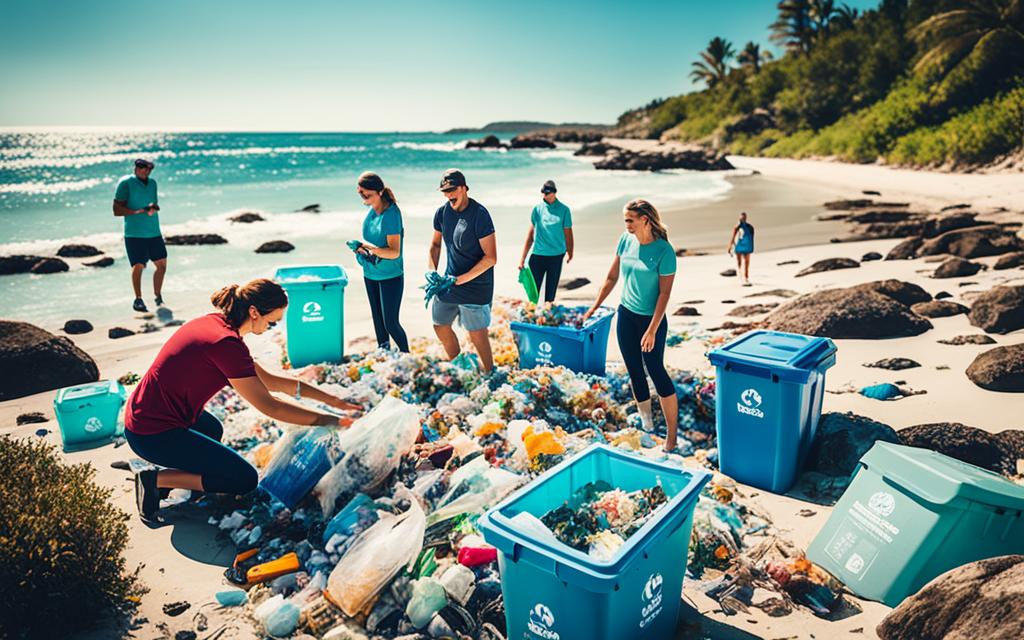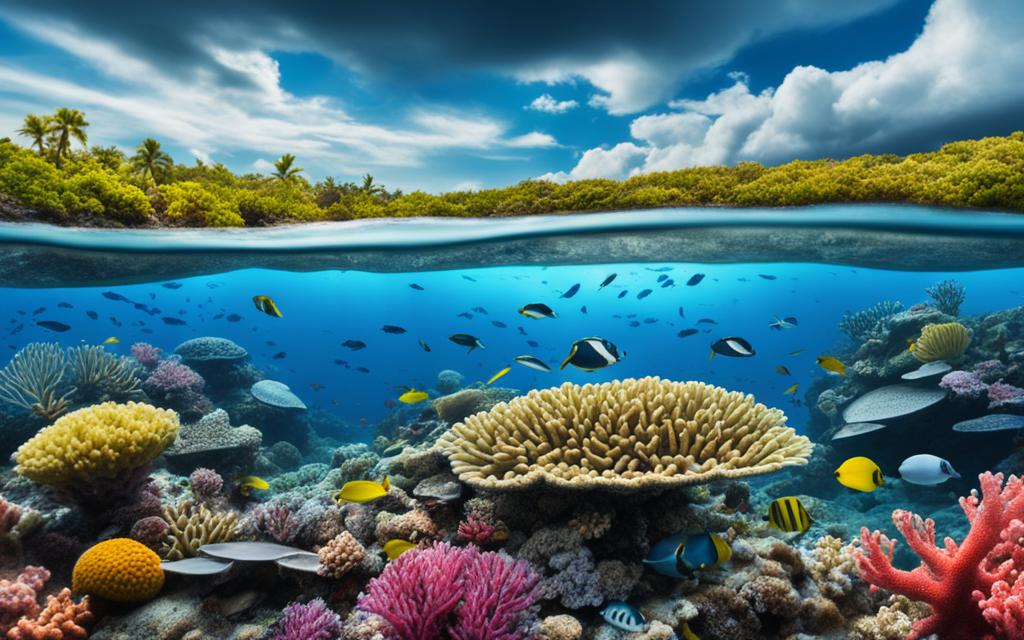Welcome to our latest article that dives into the crucial issue of ocean pollution and the legal strategies that can help combat it. At [Environmental Law Firm], we firmly believe in advocating for the seas and protecting our precious marine ecosystems. By employing sustainable legal practices, we can make a significant impact on reducing pollution and safeguarding the health of our oceans.
Ocean pollution is a global crisis that requires urgent attention. It stems from various sources such as land-based activities, maritime industries, and even climate change. To address this complex issue, legal solutions play a crucial role in providing the framework and enforcement necessary to drive positive change.
In this article, we will explore the significance of legal strategies in the fight against ocean pollution. We will delve into the role of environmental law firms and their commitment to sustainable practices. By advocating for the seas through innovative legal approaches, we can pave the way for the preservation and restoration of our marine ecosystems.
Join us on this journey as we discover the power of legal solutions in tackling ocean pollution head-on. Together, let’s work towards a sustainable future for our oceans and all the life they support.
Key Takeaways:
- Legal strategies play a crucial role in addressing ocean pollution and protecting marine ecosystems.
- Environmental law firms are at the forefront of advocating for the seas through sustainable practices.
- Ocean pollution is a global crisis caused by various sources, including land-based activities and maritime industries.
- Sustainable legal practices can pave the way for the preservation and restoration of marine ecosystems.
- By working together, we can create a sustainable future for our oceans and combat the detrimental effects of pollution.
Understanding the Ocean Pollution Crisis
The ocean pollution crisis is a pressing issue that poses significant threats to marine ecosystems around the world. It is crucial to comprehend the causes of ocean pollution and the adverse effects it has on our oceans in order to address this crisis effectively. By understanding the magnitude of the problem, we can develop and implement the necessary legal solutions to protect and preserve our oceans for future generations.
One of the primary causes of ocean pollution is the discharge of waste and pollutants from various human activities. Industrial activities, such as improper waste disposal and chemical spills, contribute to the contamination of marine environments. Additionally, agricultural run-off, which includes fertilizers and pesticides, enters waterways and eventually makes its way to the ocean, causing harmful algal blooms and disrupting the delicate balance of marine ecosystems.
The effects of ocean pollution are vast and far-reaching. The pollution negatively impacts marine biodiversity, leading to the destruction of coral reefs, contamination of fish and other marine organisms, and the disruption of food chains. Moreover, ocean pollution can result in the depletion of oxygen levels in the water, leading to dead zones where marine life cannot survive.
To combat the ocean pollution crisis, legal solutions are crucial. By implementing laws and regulations that prevent pollution at its source, we can significantly reduce the amount of waste entering our oceans. Moreover, legal frameworks can hold responsible parties accountable for their actions and provide incentives for sustainable practices.
It is imperative that we recognize the severity of the ocean pollution crisis and take action to protect our marine ecosystems. By understanding the causes and effects of ocean pollution, we can work toward implementing effective legal solutions that promote the preservation and sustainability of our oceans for future generations.
The Role of Legal Solutions for Environmental Issues
When it comes to addressing environmental issues, including ocean pollution, legal solutions play a vital role in protecting our planet. Legal firms specializing in environmental law offer invaluable expertise and guidance in navigating complex regulations and compliance requirements.
One of the key contributions of legal firms is providing environmental compliance solutions. These solutions help businesses and organizations ensure that they adhere to environmental laws and regulations, minimizing their impact on the environment. From advising on waste management practices to facilitating clean energy transitions, legal experts help their clients implement sustainable and eco-friendly practices.
Additionally, legal firms offer eco-friendly legal services that focus on advocating for environmental protection and sustainability. These services include representing clients in environmental litigation cases, lobbying for policy changes, and negotiating agreements that promote sustainable practices. By leveraging their legal expertise, these firms work towards creating a more environmentally conscious and responsible society.
Environmental law firms also play a crucial role in providing environmental legal advice. They assist individuals, businesses, and organizations in understanding their rights and responsibilities regarding environmental matters. Whether it’s advice on environmental impact assessments, permit applications, or compliance audits, legal experts empower their clients to make informed decisions that benefit both their business interests and the environment.
Through their expertise and commitment to environmental advocacy, legal professionals contribute to the larger goal of preserving our planet’s natural resources and biodiversity. By seeking legal advice and services from these firms, individuals and organizations can actively participate in creating a more sustainable future.

The U.S. Ocean Justice Strategy: A Blueprint for Change
When it comes to addressing the pressing issue of ocean pollution, the U.S. Ocean Justice Strategy stands as a crucial blueprint for change. This comprehensive approach aims to tackle the challenges faced by marine ecosystems by promoting equity and environmental justice in ocean policy, incorporating local and indigenous knowledge in conservation efforts, and building a diverse and accessible ocean workforce.
Equity and Environmental Justice in Ocean Policy
Equity plays a pivotal role in ensuring fair and just outcomes in ocean policy. The U.S. Ocean Justice Strategy recognizes the importance of providing equal access and opportunities for all communities, especially those that have historically been marginalized or disproportionately affected by environmental degradation. By prioritizing equity, this strategy aims to rectify existing inequalities and promote a more inclusive approach to ocean policy.
Local and Indigenous Knowledge in Conservation
Incorporating local and indigenous knowledge systems into conservation efforts is fundamental to the success of ocean protection. These knowledge systems, rooted in generations of experience and resource stewardship, offer invaluable insights into sustainable practices and ecosystem functioning. By acknowledging and respecting this knowledge, the U.S. Ocean Justice Strategy strives to forge effective partnerships with local communities and indigenous peoples, fostering collaborative conservation efforts that honor their traditional practices and wisdom.
Building a Diverse and Accessible Ocean Workforce
A diverse and accessible ocean workforce is essential for effective conservation and sustainable management. The U.S. Ocean Justice Strategy recognizes the need to cultivate a workforce that reflects the diversity of the communities it serves. By promoting inclusivity and providing opportunities for individuals from underrepresented backgrounds, this strategy aims to create a stronger, more innovative, and more resilient ocean workforce capable of addressing the complex challenges facing our oceans.
| Benefits of the U.S. Ocean Justice Strategy | Key Components |
|---|---|
| Promotes equity and environmental justice | Integration of local and indigenous knowledge |
| Enhances community engagement and collaboration | Diversity and inclusivity in the ocean workforce |
| Fosters sustainable and collaborative conservation | Evidence-based decision-making |
The U.S. Ocean Justice Strategy sets a transformative path forward in addressing ocean pollution. By prioritizing equity, local and indigenous knowledge, and a diverse ocean workforce, this strategy aims to ensure a sustainable and just future for our oceans and the communities that depend on them.
International Law and Ocean Conservation: UNCLOS and Beyond
In the realm of ocean conservation, international law plays a pivotal role in ensuring the protection and sustainable management of marine resources. One of the most significant legal frameworks in this regard is the United Nations Convention on the Law of the Sea (UNCLOS), a comprehensive treaty that establishes the rights and responsibilities of nations concerning the world’s oceans.
Freedom of Navigation and Exclusive Economic Zones
UNCLOS upholds the principle of freedom of navigation, granting all states the right to move ships through international waters without any hindrances. This freedom is crucial for trade, exploration, and scientific research, facilitating global connectivity and cooperation. Additionally, UNCLOS provides a framework for the establishment of exclusive economic zones (EEZs), allowing coastal states to exercise sovereignty over the natural resources within 200 nautical miles of their coastlines. These zones serve as important areas for sustainable economic development and environmental protection.
Protecting Marine Biodiversity on the High Seas
While EEZs offer significant conservation opportunities, the high seas—the vast areas beyond national jurisdiction—also require robust protection. UNCLOS addresses this need by promoting the conservation and sustainable use of marine biodiversity on the high seas. It emphasizes the importance of preventing overfishing, minimizing pollution, and effectively managing marine ecosystems to preserve their ecological balance.
The International Seabed Authority and Its Mandate
The International Seabed Authority (ISA), established under UNCLOS, has a crucial role in the sustainable development of deep seabed resources. The ISA regulates activities related to seabed mining in international waters, ensuring the equitable and responsible exploitation of these resources while safeguarding the marine environment. By setting strict environmental standards and promoting scientific research, the ISA seeks to balance economic interests with the preservation of marine biodiversity and the protection of vulnerable ecosystems.

| Key Points | |
|---|---|
| UNCLOS guarantees freedom of navigation and establishes exclusive economic zones. | |
| It emphasizes protecting marine biodiversity on the high seas. | |
| The International Seabed Authority regulates deep seabed mining activities. |
Collaborative Efforts for Protected Marine Ecosystems
Protecting marine ecosystems requires collective action and collaborative efforts. Through marine conservation partnerships and the establishment of protected marine areas, we can work together to safeguard our oceans for future generations.
Marine conservation partnerships play a crucial role in uniting different stakeholders, including government entities, non-profit organizations, research institutions, and local communities. These partnerships bring together diverse perspectives and expertise to develop comprehensive strategies for marine conservation.
“Collaboration is key in protecting our marine ecosystems. By joining forces, we can pool resources, knowledge, and efforts to make a significant impact in preserving the health and biodiversity of our oceans.” – Dr. Samantha Johnson, Marine Biologist
Protected marine areas are designated regions that are legally protected to promote the conservation of marine biodiversity and habitats. These areas serve as sanctuaries for vulnerable species and ecosystems, ensuring their long-term survival and resilience.
Through collaborative efforts, marine conservation partnerships can advocate for the creation and maintenance of protected marine areas. By working together, these partnerships can influence policy decisions, secure funding for conservation initiatives, and raise awareness about the importance of protecting our oceans.
Table: Benefits of Collaborative Efforts for Protected Marine Ecosystems
| Benefits | Description |
|---|---|
| Enhanced Conservation | Collaborative efforts allow for more comprehensive and effective conservation measures, leading to enhanced protection for marine ecosystems. |
| Shared Resources | Partnerships enable the sharing of resources, including expertise, research data, funding, and technology, to maximize conservation efforts. |
| Increased Impact | Working together amplifies the impact of conservation initiatives, creating a collective force that can drive significant change in protecting marine ecosystems. |
| Community Engagement | Collaboration fosters community engagement and empowerment, ensuring that local communities are involved in decision-making processes and benefit from conservation efforts. |
| Long-term Sustainability | By establishing protected marine areas through collaboration, we can ensure the long-term sustainability of marine ecosystems and the services they provide. |
By recognizing the value of collaborative efforts and investing in marine conservation partnerships, we can make significant strides in protecting our precious marine ecosystems and ensuring their future viability.
Creating Sustainable Practice: The Regional Seas Programme
The Regional Seas Programme is a global initiative that aims to promote sustainable marine practices and conservation. Through international collaboration and marine conservation agreements, the program works towards safeguarding the health and integrity of regional marine ecosystems.
The Regional Seas Programme focuses on establishing effective governance frameworks and supporting the implementation of sustainable practices in regional seas around the world. By bringing together governments, local communities, and stakeholders, the program fosters partnerships that facilitate the protection and management of marine resources.
One of the key goals of the Regional Seas Programme is to address the challenges posed by various threats to marine ecosystems, such as pollution, overfishing, and habitat destruction. Through coordinated efforts, the program seeks to mitigate these impacts and promote the sustainable use of marine resources.
“The Regional Seas Programme plays a crucial role in ensuring the long-term health and resilience of our oceans. By promoting sustainable marine practices and fostering marine conservation agreements, the program is a driving force in protecting our marine ecosystems for future generations.” – Dr. Jane Wilson, Marine Conservation Expert
The Regional Seas Programme has achieved significant milestones in its efforts to promote sustainability and conservation. It has facilitated the establishment of numerous marine protected areas, ensuring the preservation of critical habitats and biodiversity hotspots. The program also plays a crucial role in monitoring and managing marine pollution, promoting sustainable fisheries, and enhancing coastal resilience to climate change.
The impact of the Regional Seas Programme extends beyond individual regions, as its success has inspired the replication of its principles and strategies in other parts of the world. By sharing best practices and exchanging knowledge, the program contributes to a global movement towards sustainable marine practices and the protection of our oceans.
| Benefits of the Regional Seas Programme |
|---|
| Promotes sustainable marine practices |
| Facilitates the establishment of marine protected areas |
| Coordinates efforts to address marine pollution |
| Enhances coastal resilience to climate change |
| Encourages international collaboration and knowledge sharing |
Targeting Ocean Pollution at the Source
In order to effectively address ocean pollution, it is crucial to target the sources of pollution and implement strategies for prevention and mitigation. This section will explore key areas of focus in targeting ocean pollution, including combating land-based pollution, regulating the maritime industry and cargo ships, and the importance of global programs for marine environment protection.
Combating Land-Based Pollution
Land-based pollution is a major contributor to ocean pollution, with contaminants such as plastics, chemicals, and nutrients making their way into water bodies through rivers and runoff. Efforts to combat land-based pollution involve implementing strict regulations, promoting sustainable practices, and educating communities about proper waste management.
Regulating Maritime Industry and Cargo Ships
The maritime industry plays a significant role in ocean pollution, primarily through the release of harmful substances, illegal dumping, and accidental spills. To address this issue, it is essential to enforce stringent regulations for maritime operations, including the proper disposal of waste, the use of eco-friendly technologies, and the monitoring of vessel activity to prevent illegal practices.
The Global Programme for Marine Environment Protection
The Global Programme for Marine Environment Protection (GPMEP) is an international initiative aimed at safeguarding the marine environment from pollution and promoting sustainable practices. The GPMEP works in collaboration with governments, organizations, and stakeholders to develop policies, guidelines, and frameworks to combat ocean pollution, protect marine ecosystems, and ensure the sustainable use of marine resources.

| Land-Based Pollution | Maritime Industry Regulation | Global Programme for Marine Environment Protection |
|---|---|---|
| Combating land-based pollution through strict regulations and sustainable practices. | Enforcing regulations for maritime operations, waste disposal, and monitoring vessel activity. | International initiative promoting sustainable practices and protecting marine ecosystems. |
| Reducing contaminants such as plastics, chemicals, and nutrients entering water bodies through rivers and runoff. | Promoting the use of eco-friendly technologies and preventing illegal dumping and spills. | Collaborating with governments, organizations, and stakeholders to develop policies and frameworks. |
| Educating communities on proper waste management and the impact of land-based pollution on marine ecosystems. | Monitoring and regulating vessel activity to prevent harmful practices and accidents. | Ensuring the sustainable use of marine resources for future generations. |
Green Litigation: Ocean Advocates in the Courtroom
Green litigation plays a vital role in advocating for ocean conservation and protecting marine ecosystems. Through legal battles for ocean conservation, dedicated advocates fight to ensure the health and preservation of our oceans for future generations. These legal actions have a profound impact on environmental policy and shape sustainable practices.
One notable example of green litigation in action is the case of Ocean Advocacy Group v. Polluting Corporation. In this landmark legal battle, Ocean Advocacy Group, a leading environmental law firm, took on a powerful polluting corporation that was responsible for significant ocean pollution. Through extensive litigation, evidence gathering, and expert testimony, Ocean Advocacy Group successfully held the corporation accountable for its harmful actions, resulting in substantial penalties and the implementation of stricter environmental regulations.
Green litigation provides a platform for ocean advocates to champion the cause of ocean conservation in the courtroom. It enables them to challenge polluters, hold them accountable, and seek justice for the marine ecosystems that are deeply impacted by human activities.
By leveraging legal strategies, ocean advocates ensure that the voices of the oceans are heard and legally protected. Through their dedicated efforts, they seek to establish precedents that define and defend the rights of marine ecosystems, setting the stage for more sustainable practices and policies.
From challenging harmful industrial practices to advocating for stricter regulations on fisheries and maritime activities, green litigation brings attention to critical issues facing our oceans. These legal battles create awareness, encourage public engagement, and foster community action towards ocean conservation.
It is through the power of the courtroom and legal advocacy that societal attitudes towards the environment can be transformed. Green litigation serves as a catalyst for change, compelling individuals, corporations, and governments to consider the long-term implications of their actions and make conscious choices that prioritize the health and preservation of our oceans.
Innovative Policies for Ocean Health and Climate Resilience
As the world grapples with the effects of climate change, innovative policies are crucial for promoting ocean health and building climate resilience. These policies aim to address the unique challenges posed by climate change to marine ecosystems and ensure their long-term sustainability. By implementing forward-thinking strategies, we can mitigate the impacts of climate change on our oceans and safeguard their invaluable biodiversity.

One such innovative policy is the establishment of marine protected areas (MPAs) that serve as sanctuaries for marine life. These areas not only conserve biodiversity but also provide natural resilience to climate change by acting as refuges for species and ecosystems. MPAs contribute to the restoration of damaged habitats and the preservation of critical marine habitats, contributing to the overall health and conservation of our oceans.
“Innovative policies can play a transformative role in protecting our oceans and ensuring their resilience in the face of climate change. By adopting forward-thinking strategies, we can secure the future of our marine ecosystems and preserve their invaluable ecological services for generations to come.”
– Dr. Emily Roberts, Marine Biologist
Another innovative policy is the implementation of sustainable fisheries management practices. By adopting science-based approaches, such as implementing catch limits and gear restrictions, we can promote sustainable fishing practices and prevent overfishing. This not only helps to maintain fish populations but also supports the overall health of marine ecosystems, as healthy fish populations play a vital role in maintaining ecological balance.
In addition to these policies, initiatives aimed at reducing greenhouse gas emissions and promoting renewable energy sources are crucial for combating climate change and protecting ocean health. By transitioning to clean energy alternatives, we can reduce the carbon footprint associated with traditional energy production, minimizing the impacts of climate change on our oceans. Furthermore, investing in research and development of climate-resilient technologies can provide innovative solutions for adapting to the changing oceanic conditions.
By implementing these innovative policies, we can foster ocean health and bolster climate resilience. These strategies address the urgent need to protect our oceans and ensure their sustainability in the face of climate change. Moving forward, it is essential that governments, institutions, and individuals continue to prioritize and support these innovative approaches to safeguard the future of our oceans and marine ecosystems.
Empowering Communities Through Environmental Policy Consulting
In the pursuit of sustainable practices and community empowerment, environmental policy consulting plays a crucial role. Consulting firms specializing in environmental policy offer guidance and support to communities, helping them to navigate the complex landscape of environmental regulations and implement effective policies.
Environmental policy consulting firms work closely with communities to assess their specific needs and develop tailored strategies that promote sustainable practices. This collaborative approach ensures that policies are not only aligned with environmental goals but also consider the unique characteristics and resources of each community.
Through environmental policy consulting, communities gain access to expert knowledge and resources that enable them to make informed decisions. Consultants provide valuable insights into best practices, emerging trends, and innovative solutions, empowering communities to create and implement policies that address their environmental challenges effectively.
Moreover, environmental policy consulting fosters community empowerment by promoting participatory decision-making processes. Consultants facilitate community engagement, ensuring that all stakeholders have a voice in policy development and implementation. This inclusive approach strengthens community cohesion, enhances local ownership of policies, and fosters a sense of responsibility for environmental stewardship.
Environmental policy consulting serves as a bridge between communities and sustainable practices, facilitating the transition towards a greener and more equitable future.
By engaging in environmental policy consulting, communities not only contribute to their own well-being but also become active participants in the global movement towards sustainable development. Their efforts not only improve local environmental conditions but also contribute to the overall conservation of ecosystems and the preservation of natural resources.
Environmental policy consulting plays a vital role in empowering communities to take meaningful action and champion sustainable practices. By providing guidance, expertise, and fostering community engagement, consulting firms play a pivotal role in catalyzing positive change and creating a more sustainable future for all.
Conclusion
In conclusion, legal strategies play a vital role in addressing ocean pollution and protecting marine ecosystems. Throughout this article, we have explored the different facets of this urgent issue and highlighted the importance of environmental advocacy in combating the crisis.
By utilizing legal solutions, such as those offered by environmental law firms and sustainable legal practices, we can effectively tackle the causes and effects of ocean pollution. Initiatives like the U.S. Ocean Justice Strategy provide a blueprint for change by promoting equity in ocean policy, incorporating local and indigenous knowledge, and fostering a diverse and accessible ocean workforce.
International law, particularly the United Nations Convention on the Law of the Sea (UNCLOS), serves as a crucial framework for ocean conservation. It regulates activities such as freedom of navigation, protection of marine biodiversity, and the governance of the international seabed area through entities like the International Seabed Authority.
However, it is not enough to rely solely on legal frameworks. Collaborative efforts, such as marine conservation partnerships and the Regional Seas Programme, are essential in establishing and maintaining protected marine areas. Additionally, targeting ocean pollution at its source by combatting land-based pollution, regulating the maritime industry, and supporting global programs for marine environment protection are crucial steps toward a healthier ocean.
Ultimately, with green litigation and innovative policies, we can continue to advocate for the seas in the courtroom and promote sustainable practices for ocean health and climate resilience. By empowering communities through environmental policy consulting, we can ensure that all stakeholders are actively involved in the protection and preservation of our invaluable marine ecosystems.
As we move forward, it is clear that legal strategies are indispensable tools in our mission to confront ocean pollution. Through environmental advocacy and a collective drive for change, we can secure a brighter and more sustainable future for our oceans.
FAQ
What are some legal strategies to confront ocean pollution?
What is the role of environmental law firms in addressing environmental issues?
What are the causes and effects of ocean pollution?
What is the U.S. Ocean Justice Strategy?
How does international law contribute to ocean conservation?
What are some collaborative efforts for protecting marine ecosystems?
What is the Regional Seas Programme?
How can we target ocean pollution at its source?
What is the role of green litigation in ocean conservation?
What innovative policies are in place to promote ocean health and climate resilience?
How does environmental policy consulting empower communities?
Source Links
- https://www.whitehouse.gov/ceq/news-updates/2023/12/22/what-they-are-saying-biden-harris-administration-unveils-first-ever-u-s-ocean-justice-strategy/
- https://www.un.org/en/global-issues/oceans-and-the-law-of-the-sea
- https://www.unep.org/news-and-stories/story/how-world-helping-safeguard-its-oceans-and-seas
